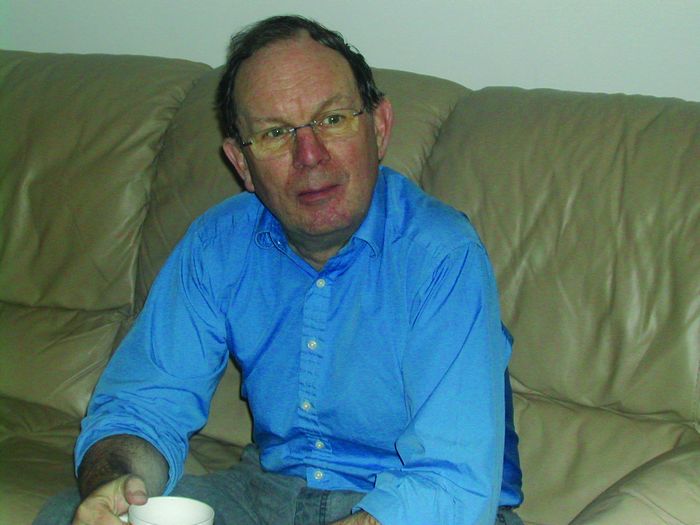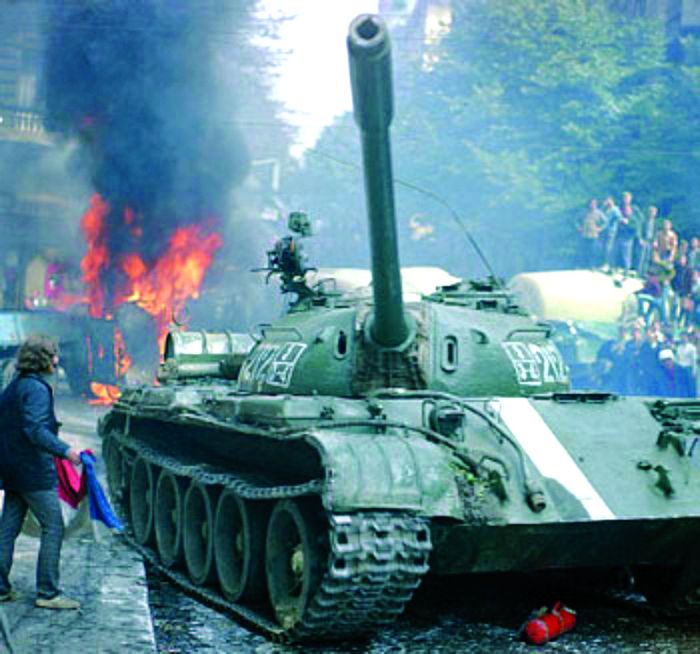I was married in a Bohemian Castle
Part 7 (of 8) The Prague Spring – by Richard Slater
St Peter’s Road resident and technical author Richard Slater recounts his days in Bohemia. [Bohemia is the western province of the Czech Republic; the eastern one is Moravia.] In this seventh part, Richard describes the 1968 ‘Prague Spring’.
Two years after our wedding, in mid-1968, my wife was notified that her permanent exit visa had been granted, and she could go back to Prague if she wished to collect the visa, her furniture and other belongings. The ‘Prague Spring’ had begun – we were interested to see how things had changed and so decided that we would both go.
The Prague Spring was a brief period during which Czechoslovakia attempted a limited measure of political liberalisation from hard-line communist rule; it lasted only from early January 1968 to 21st August of that year, when the armed forces of the Warsaw Pact invaded the country in strength.
In early 1968, Alexander Dubcek became First Secretary of the Czech Communist Party, and Ludvig Svoboda (ironically, Svoboda means ‘freedom’ in Czech) became President. In April 1968, Dubcek presented a programme of liberalisation measures including a degree of increased freedom of the press and the possibility of a more democratic form of government. He called it ‘Socialism with a Human Face’. The programme clearly stipulated that reform must proceed under the direction of the Communist Party. However, popular pressure mounted for immediate action, and anti-Soviet opinions soon appeared in the press, and such ‘Western bourgeois’ activities as jazz, rock and alternative theatre became popular. In June, a manifesto entitled ‘Two Thousand Words’ was published, expressing concern about opposition within the Party and from ‘foreign’ (i.e. Russian) forces, and calling on ‘the people’ to take the initiative in implementing the reforms. Dubcek denounced the manifesto. Meanwhile, in late June, planned Warsaw Pact military manoeuvres were being held in Czechoslovakia.
The Soviet leadership was afraid the reforms would set a precedent and tried to prevent or at least limit them. Talks were held, at which Dubcek defended the programme. The Soviet leader, Leonid Brezhnev, decided to compromise, but the Czech delegates had to reaffirm their loyalty to the Warsaw Pact and Comecon [the Eastern Bloc trading group], and promise to curb ‘anti-socialist’ tendencies, prevent the revival of the Czechoslovak Social Democratic Party, and control the press more effectively.
In early August, representatives from the Soviet Union, East Germany, Poland, Hungary, Bulgaria and Czechoslovakia met in Bratislava and signed the Bratislava Declaration. This declared unshakable loyalty to Marxism-Leninism and an implacable struggle against ‘bourgeois’ ideology. The Soviet Union stated that it would intervene in any Warsaw Pact country if a ‘bourgeois’ system were established. The Soviet troops then left, but remained close to the Czechoslovak borders.
However, the Soviet leadership was not satisfied with these talks and began to consider a military alternative. I see from my old passport visa stamps that my wife and I were in Prague from 27th July to 2nd August 1968. My wife’s belongings left Prague for London on 18th August on the weekly customs-sealed truck; it would be the last such truck for some time. On the night of 21st/22nd August, Eastern Bloc armies from five Warsaw Pact countries invaded Czechoslovakia. Amazingly, Czech TV managed to keep sending pictures for several days: these were relayed around the world, so we were able to sit at home in Hampshire and watch events unfolding live on the BBC.
During the invasion, thousands of Soviet tanks occupied the streets, accompanied by 200,000 or more Warsaw Pact troops. Dubcek ordered his army and the people not to resist, but 72 Czechoslovaks were killed and hundreds wounded. As many as 150,000 more fled to the West. Eva’s mother had a souvenir – a machine-gun bullet that came in through her front window, but missed her.
Leave a Response
You must be logged in to post a comment.



